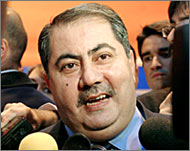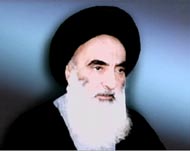Security Council to consider Iraq’s future
With the long manhunt for Saddam Hussein finally over, the UN Security Council will meet on Tuesday to discuss the still uncertain political future of Iraq.

Iraq’s interim foreign minister, Hoshyar Zebari, is expected to face a grilling by the 15-nation council, whose bitter divisions over the Iraq war again risk bubbling to the surface.
The United States hopes the dramatic weekend capture of Saddam will unite the council behind its plan for rebuilding of Iraq and the delicate steps needed to establish an interim Iraqi government in the next few months.
“Affirmations of support for the political, economic and security development of Iraq would be most welcome indeed, and most appropriate under the circumstances,” US ambassador John Negroponte said on Monday.
 |
|
Iraqi Foreign Minister Hoshyar |
But an especially terse statement from Security Council president Stefan Tafrov of Bulgaria on Saddam’s capture, reflected the reluctance of other nations to throw their full support behind US plans in Baghdad.
“Council members welcomed the capture of Saddam Hussein on December 13,” he said.
Large UN role
France, Germany and Russia, the council nations that led opposition to the war, want a large role for the United Nations in the political transition and reconstruction of Iraq.
The council will discuss a step-by-step plan, hatched by the United States and its handpicked Iraqi Governing Council, to end the US occupation by June, and will quiz Zebari on how Iraq plans to prepare for the handover.
He is also expected to be questioned on plans for the trial of Saddam in Iraq, where the Governing Council last week set up a special tribunal to try the former members of Saddam’s regime.
Execution dispute
The Governing Council president, Abd al-Aziz al-Hakim, said on Monday that Saddam could be subject to the death penalty, a possibility that UN Secretary General Kofi Annan said should be rejected.
|
“The UN does not support the death penalty. So as secretary general… (I’m not) going to now turn around and support the death penalty” Kofi Annan, |
“This should be done through open trials in properly established courts of law which will respect basic international norms and standards, including respect for international humanitarian law,” Annan said.
“The UN does not support the death penalty,” he said. “So as secretary general… (I’m not) going to now turn around and support the death penalty.”
Annan met on Monday with Jeremy Greenstock, the top British envoy in Iraq, who told reporters that any major return of the United Nations to Iraq was unlikely until the US-led occupation finishes at the end of June.
Ambassador Heraldo Munoz of Security Council member Chile suggested Saddam’s capture could pave the way for an even faster handover of power to Iraqis, a proposal that drew a lukewarm response from US officials.
“We expect with Saddam Hussein out of the picture maybe to hasten the process, so that sovereignty can go back into the hands of the Iraqis as quickly as possible,” Munoz said.
Iraqis divided
With the United States concerned about the fall-out if Iraqis prove unable to make a successful go of their new government, however, one official told AFP: “We want to avoid acceleration for acceleration’s sake.”
 |
|
Ayat Allah Ali al-Sistani wants |
Under an agreement reached on November 15 between the United States and the Governing Council, sovereignty would be handed to a provisional government before the end of June. Proper elections would not be held until 2005.
But Iraqis are divided over the process and Grand Ayat Allah Ali al-Sistani, Iraq’s highest-ranking Shia cleric, wants immediate general elections.
US ambassador Negroponte on Monday again repeated that Washington believes the United Nations has a “vital” role to play in the process, but that has yet to be spelled out.
In a report that he will formally present on Tuesday, Annan said Iraq remains too dangerous to send his international staff back to Baghdad.
He said security would have to be improved before he would consider risking the lives of his staff in Iraq, where the UN’s Baghdad headquarters was bombed on 19 August, killing 22 people, including his special envoy.